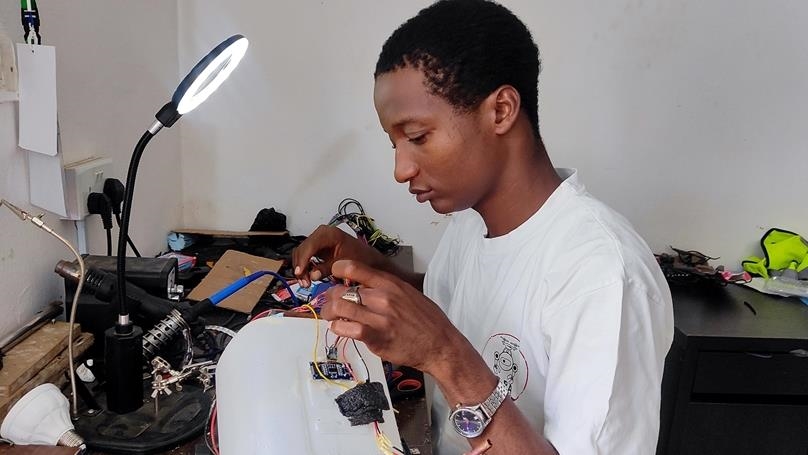Nigerian youth develops UAV that detects agricultural diseases
‘Farmers were pleased with the quick detection of diseases, time savings in spraying, reduced health risks,’ says Shamsudeen Jibril

KADUNA, NIGERIA/ISTANBUL
Shamsudeen Jibril from Kaduna State, Nigeria, has developed an unmanned aerial vehicle (UAV) that can detect agricultural diseases and spray pesticides.
Jibril, a 25-year-old aerospace engineering graduate, wants to increase agricultural productivity and support farmers in their fight against disease with the UAV he developed.
The UAV scans agricultural fields from the air to detect disease symptoms, transfers the data to a smartphone and provides farmers with treatment and preventive recommendations.
Aiming to prevent plant diseases that cause yield losses in agriculture, Jibril provides farmers with time savings and ease in combating agricultural diseases with the tool he developed.
From childhood dream to reality
Jibril told Anadolu that his interest in technology and aviation began in childhood.
He said he joined the school's robotics club during high school and tried to recreate the airplane designs he saw on television using cardboard and waste materials.
Jibril said he was inspired by his father to combine agriculture and his skills.
“My father was a civil servant, but he also worked as a farmer. While fertilizing and spraying the fields, he carried heavy loads on his back and was exposed to chemicals. Seeing the difficulties he faced, I decided to develop this idea,” Jibril said.
Local resources preferred in production
Jibril said many parts of the vehicle are locally produced, but critical components such as engines and control systems are imported from abroad.
He noted that the parts are expensive and take time to procure. “I need funding and support to increase production and reach more farmers. Support from the government or private sector would greatly facilitate our work,” he said.
A goal extending from Kaduna to Africa
Jibril said he aims to help not only his father but farmers in the region and across Africa with the UAV.
He reported that farmers were satisfied with the vehicle during trials conducted on agricultural lands in Kaduna. “Farmers were pleased with the quick detection of diseases, time savings in spraying, and reduced health risks,” he said.
He explained that the remote-controlled UAV can operate smoothly for up to an hour, but due to financial constraints, he was unable to use the computer-based autonomous systems seen in more advanced models.
“In the future, I aim to produce a more advanced and autonomous model that can be operated via computer,” said Jibril.
A call to young people to embrace technology
Addressing young people interested in technology, Jibril said, “In the world we live in, everything is advancing with technology. Young people should turn to technology and not be afraid of making mistakes.”
Nigeria has been turning to technological solutions in recent years to combat food insecurity.
Innovative projects like those presented by young entrepreneurs such as Jibril have the potential to transform the country's agricultural production.








